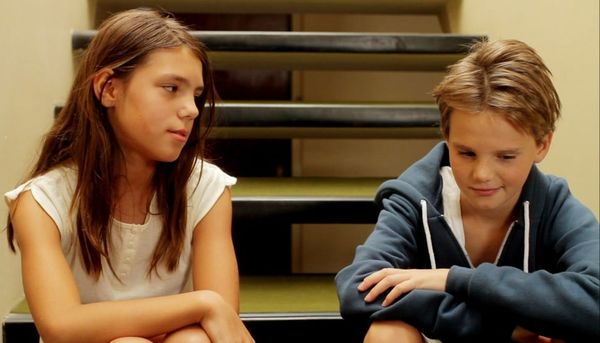Eye For Film >> Movies >> Tomboy (2011) Film Review

If it weren't for the title of Céline Sciamma's film, you would assume the cropped-haired, shorts-wearing child at the centre of the action is a boy. In many ways Laure (Zoé Héran) feels that way herself, poised as she is at that androgynous moment on the cusp of adolescence, where identity has yet to become the buttoned down outfit of adulthood. Certainly, she likes the blue walls of the home she has just moved into and some rough and tumble with her younger sister who, in contrast, keeps her hair long and loves nothing more than a frenzy of pink.
Theirs is a hug of a home, with parents (Sophie Cattani, Mathieu Demy), who emanate a relaxed sort of romance, accepting their daughters' differences with an ease that is rarely portrayed on film. When Laure heads off to scout out the neighbours, she is approached by the sparky and friendly Lisa (Jeanne Disson), who assuming her to be a boy, asks what 'his' name is. There it is, the opportunity to try an identity on for size and we watch as Laure decides to take it, not necessarily for reasons of sexuality but because in that moment, why not become Mikael?

And become him, she does. For one glorious summer of childhood games and friendships, she is a he - able to embrace the freedoms of boyhood that seem somehow more free-spirited than those on offer to girls. Small deceptions are required, of course, and Laure becomes adept at maintaining the illusion even as she and we know that a day of truth must come. There are hints that Lisa suspects something. "You're not like the others," she points out but there's no suggestion she knows why this is. The pair play at putting on make up - "You look great as a girl" Lisa tells her. And he/she does.
There is no sense of Laure 'butching up' here, but just being herself - although what that may come to mean in the future is left unsaid. This is not a film concerned with absolutes, but with the high-energy nature of childhood. Sciamma's capturing of children at play is disarmingly accurate, perfectly showing the freewheeling nature of prepubescence in all its glory. Héran is stunning in the central role, pondering but not confused, thoughtful but not to the point of breakdown and her scenes with her sister (Malonn Levana) are a pure joy to watch.
This is not an attempt by Sciamma to present a diatribe on sexual identity, just an exploration of what growing up means to one little girl, although, of course, there are deeper implications if you look for them. Her story is as warm and sunny as the French summer, where affection is easy to come by, hard to turn down and acceptance a lot more readily available than you might imagine.
Reviewed on: 08 Mar 2012
















